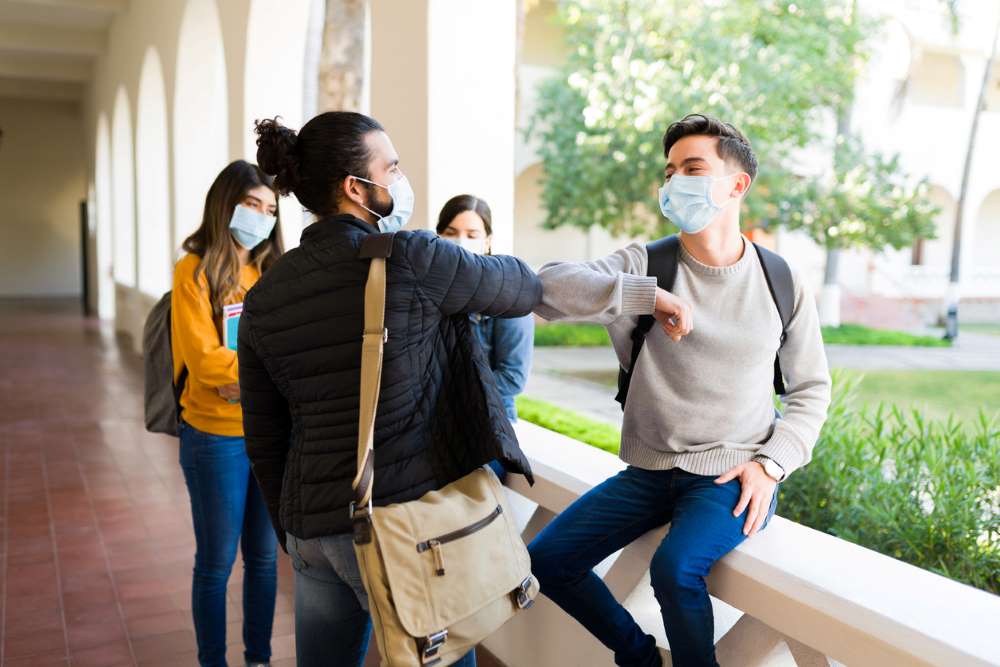
Throughout your child’s education, there are many milestones. Each one brings about mixed emotions. As exciting as it is, you might have felt your heartbreak just a little as they walked into kindergarten for the first time. But over time, it got easier and it became part of your daily routine. Over the years, they had their first day in middle school and in high school. And even though those days still brought a tear to your eye, it still didn’t prepare you for the milestone: the first day of college.
Having your child go away to college is thrilling and oddly enough, somewhat scary, especially if they’re attending out of state. And combined with the fact that we’re still trying to live our new norm with COVID, it can be downright terrifying. But in the midst of vaccinations, it’s also important to live as normally as possible. That’s why we created this guide to help you navigate your child going to college in 2022.
Create a Safety Plan
Before the first day orientation, you need to have a serious conversation with your child. Even if they’ll be attending classes on campus while living at home, certain safety measures need to be put in place. The Centers for Disease Control and Prevention lays out guidelines for colleges to protect students and faculty on campus. To help your student prevent contracting and spreading COVID-19, you need to address the following topics:
-
Staying current with vaccinations
-
Social distancing
-
Wearing masks
-
Proper hygiene
-
Avoiding large gatherings
You also need to talk about how they’ll spend their free time. As eager as they are to meet new people and participate in extracurriculars, they need to stay safe as well. Even with safety measures in place, they need to limit the number of contacts they have. Since vaccinated people can be asymptomatic, the last thing you want is for them to unknowingly catch COVID, be asymptomatic themselves and then pass it on to others. In addition, you should touch upon their financial security. You never know when an accident is going to happen, so they need to be prepared.
However, if they’re not yet in college and are worried about paying tuition, you may want to consider a low-rate parent loan. These types of loans are awarded with you as a co-signer. After filling out your own FAFSA, they will check your credit and verify your income. If approved, the loan can be combined with scholarships to cover the cost of classes and housing. Just make sure that you and your child understand how these types of loans work and when you’ll have to start paying it back.
What’s the University’s Protocol
The safety protocol of your child’s university is also important. Contact them directly and ask what preventative measures they’re using. Inquire about contact tracing and what they’ll do if students test positive. This is particularly important if they have students living on campus.
Don’t Forget Self-Care
Going to college is stressful, so it’s important to practice self-care. In addition to getting enough sleep and eating well, in order to set your kids up for success, you need to talk about mental health too. If it’s their first year, living away from home can be hard. That’s why it’s important to discuss the various resources the college has to offer for students in need. It’s also important to talk about signs of depression. It’s not uncommon for freshmen to develop depression. With so many changes at one time, life may seem overwhelming. If this happens, your child needs to know the warning signs and how to ask for help without feeling ashamed. Mental health resources are available online and on campus. Reinforce they can always come to you without judgment.
You should also practice self-care as well. Your child going off to college can cause a lot of anxiety, especially in these uncertain times. There are plenty of ways to pamper yourself and reduce feelings of anxiety. You can talk to a close friend, family members or even enlist the help of an online therapist. Also, don’t forget to eat right, get plenty of sleep and exercise regularly. Finally, make sure you and your child stay connected. If they live on campus, even five minutes on FaceTime can do wonders for both of you.
The New Kind of Homecoming
If your child does attend school out of state, homecoming needs to be planned out as well. Make sure that you check any requirements, delays, cancellations and travel restrictions before they leave campus. The last thing you want is for them to be trapped at the airport they didn't know about travel protocol. If they’re flying internationally, you need to verify the rules for arrival in the states. Even as an American, they may need to show vaccination records and a negative COVID-19 test to enter the country. Depending on where you live, they might be required to quarantine post-arrival as well. Remind your student to always protect travel documents and keep them close. They should also make electronic copies in case one is lost to avoid being held up by security or even denied travel.



























